Does testosterone have any impact on women? Perhaps you've come across the notion that testosterone's primarily responsible for strength, hairiness and sexual desire. Maybe you've assumed that women require such low levels of testosterone and that its deficiency isn't significant.
What is testosterone and why is it important for women?
Testosterone is a hormone that both men and women naturally produce. It plays a role, in aspects of health and development including;
- Muscle mass and strength
- Bone density and growth
- Body fat distribution and metabolism
- Hair growth and pattern
- Voice deepening
- Sex drive and performance
- Mood and confidence
As you can tell testosterone plays a role in the well being of both men and women. It not only influences your attributes and capabilities but also has an impact on your mental and emotional state. This is why having levels of testosterone can lead to a range of issues including;
- Fatigue and weakness
- Depression and anxiety
- Low libido and sexual dysfunction
- Reduced muscle mass and bone density
- Increased body fat and risk of obesity
- Loss of interest in hobbies and activities
- Decreased self-esteem and confidence
It's understandable that you would want to keep your testosterone levels at a level. However, what are the factors that can lead to testosterone in women?
What causes low testosterone in women?

The typical range of testosterone levels in women falls between 15 and 70 nanograms per deciliter of blood. Nevertheless this range can differ based on factors, like age, lifestyle, health conditions, medications and so on. There are a few factors that can lead to testosterone levels in women;
- As you age it is naturally expected for your testosterone levels to decrease. This decline can be influenced by factors including stress, inadequate nutrition, lack of activity and more. It's important to note that this is an occurrence and not entirely avoidable. However certain lifestyle choices may contribute to its acceleration.
- Menopause refers to the phase in a woman's life when her menstrual cycles cease and her ovaries no longer release eggs. Typically occurring between the ages of 45 and 55 menopause entails a decline in estrogen levels and a decrease in testosterone production. As a result women may experience symptoms including flashes, night sweats, mood swings and weight gain.
- Birth control pills work as a type of contraception that helps prevent pregnancy by stopping ovulation. They contain hormones that imitate the effects of estrogen and progesterone. These hormones can also decrease your body's natural testosterone levels by either blocking its production or attaching to its receptors.
- Ovarian disorders refer to conditions that impact the ovaries and their functioning. Examples of disorders include ovary syndrome (PCOS) ovarian cancer and ovarian cysts. These conditions can disrupt hormone balance. Result in decreased levels of testosterone.
- Health issues; There are other health conditions that can impact your hormone levels, such, as thyroid disorders, diabetes, liver disease, kidney disease, adrenal insufficiency, pituitary tumors and more. These medical conditions can interfere with your body's production and utilization of testosterone.
- Certain medications have the potential to reduce testosterone levels, such, as antidepressants, antipsychotics, opioids, steroids and chemotherapy. These medications can impact hormone balance by modifying brain chemistry or inhibiting enzyme activity.
How to treat low testosterone in women?
Now that you have an understanding of the factors that can lead to testosterone levels, in women you might be curious about treatment options. Fortunately there are approaches to consider based on your symptoms, their severity, personal preferences and other relevant factors. Here are a few examples;
- Lifestyle changes: Making changes to your lifestyle is the most secure method to naturally enhance your testosterone levels. This involves maintaining a balanced diet that incorporates nutrients like protein, healthy fats, complex carbohydrates, vitamins, minerals and antioxidants. Regular exercise is also crucial, particularly focusing on strength training exercises that promote muscle growth and boost metabolism. Additionally getting sleep, managing stress effectively and steering clear of habits like smoking or excessive drinking are all part of the equation for testosterone levels.
- Supplements: Supplements like testosterone boosters can be an option to enhance testosterone levels in women by providing the nutrients and compounds that the body might be deficient, in or require more of. Zinc, magnesium vitamin D, DHEA, maca root, tribulus terrestris and other supplements have shown effectiveness in boosting testosterone. Nevertheless it is essential to consult with a doctor before incorporating any supplements into your routine and strictly adhere to the recommended dosage and usage instructions.
- Hormone replacement therapy (HRT): HRT is a medical treatment that involves taking synthetic hormones to replace the ones that your body is not producing enough of. HRT can be done with pills , patches , gels , creams , injections , etc. HRT can help you restore your hormone balance and relieve your symptoms. However, HRT also has some risks and side effects, such as increased risk of blood clots , stroke , heart disease , breast cancer , etc. You should only consider HRT after consulting your doctor and weighing the pros and cons.
Conclusion
Low testosterone in women is a common and serious problem that can affect your health and happiness. It is caused by various factors that can be genetic, hormonal, lifestyle-related, or medical. To treat low testosterone in women, you have to address the root cause of your problem and choose the best option for you.






